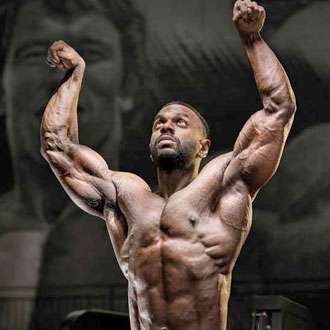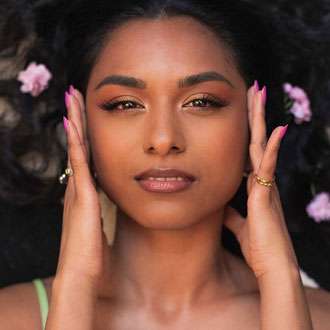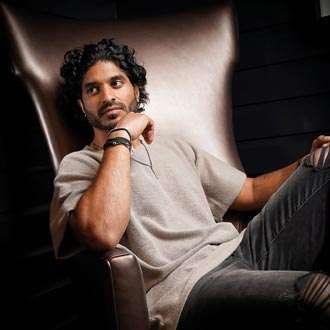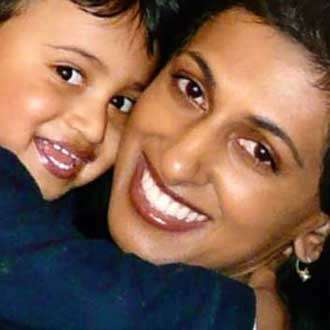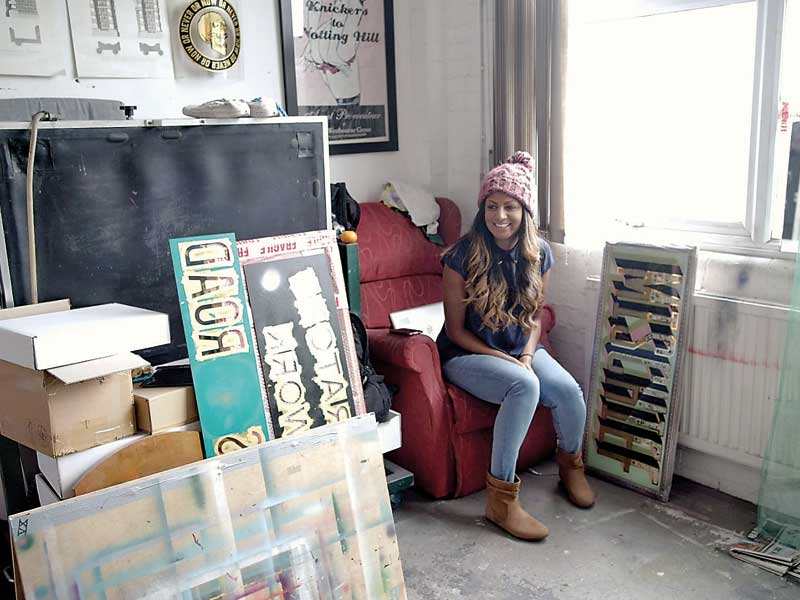
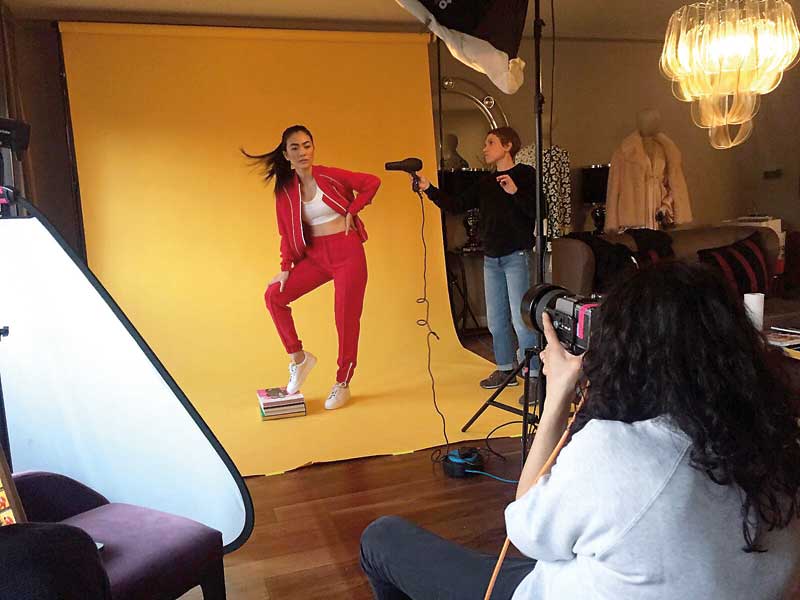
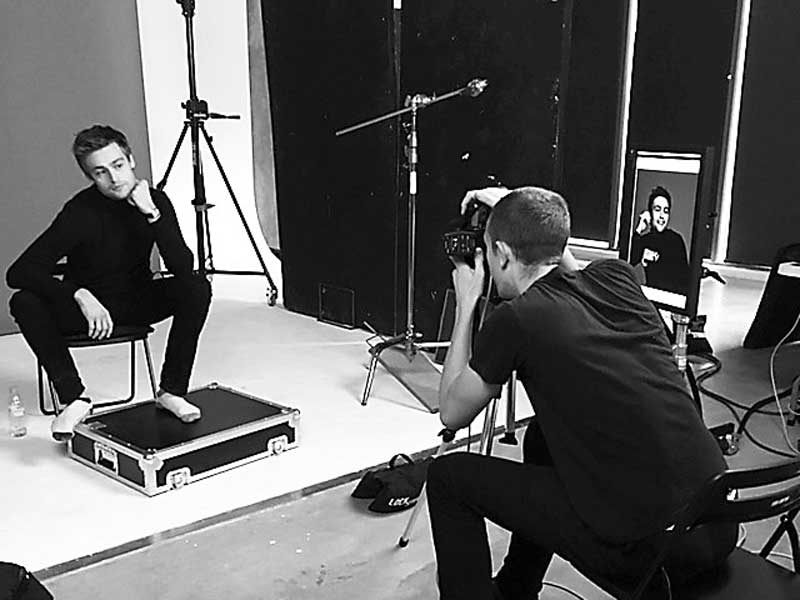
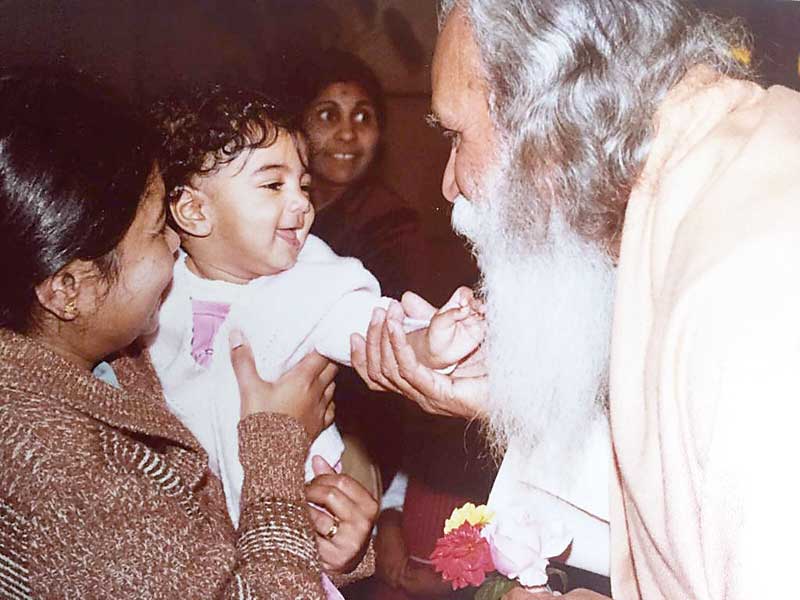
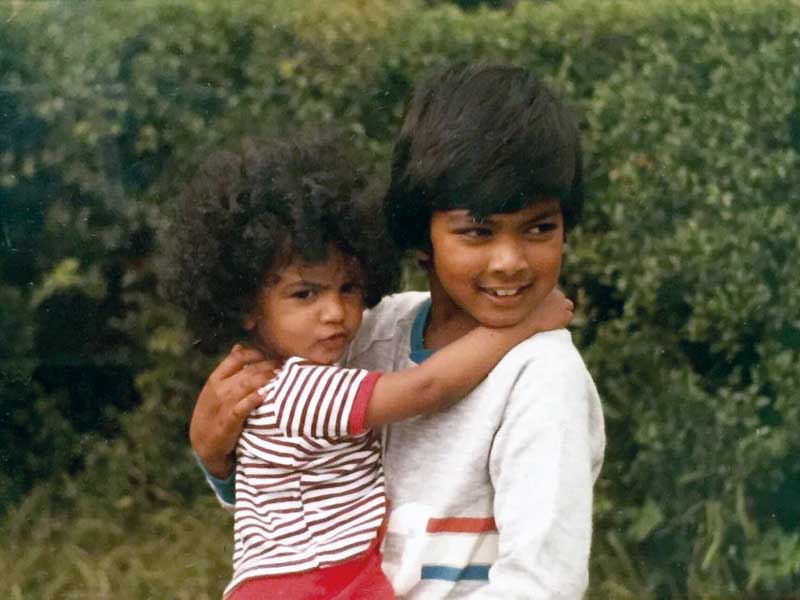
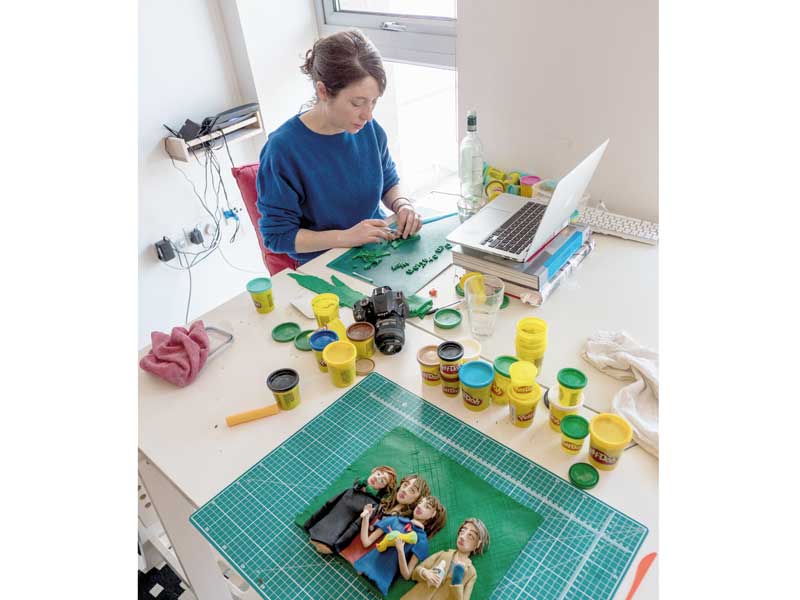
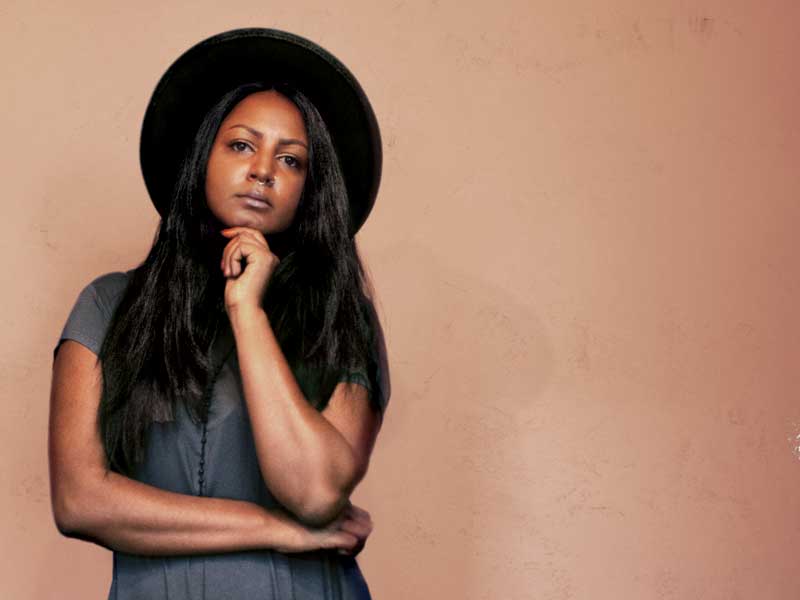
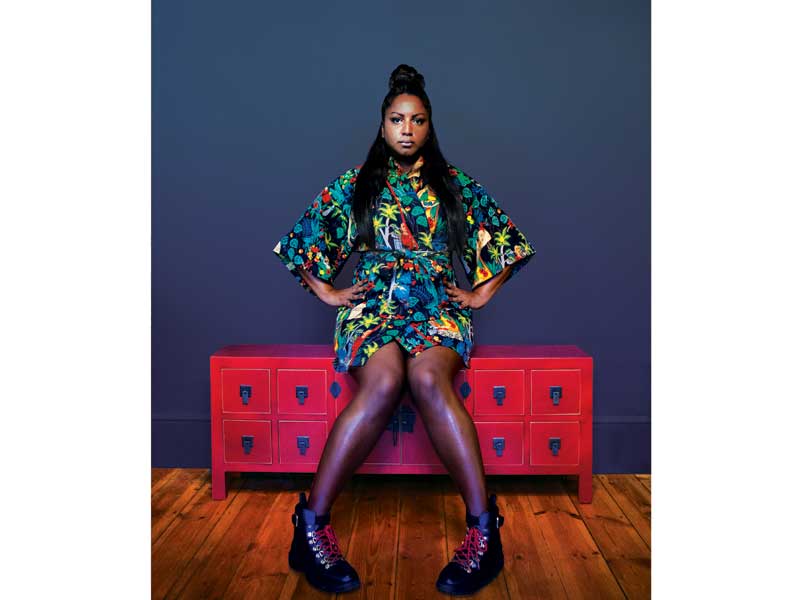
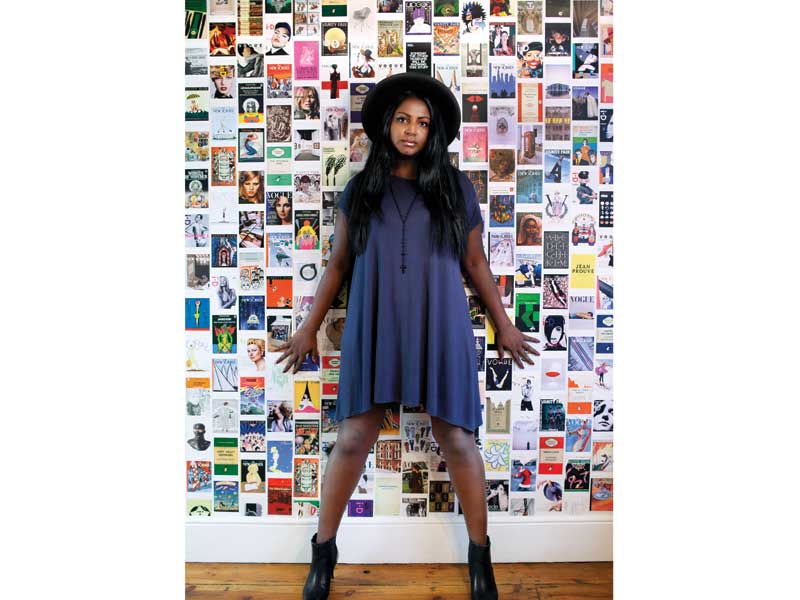
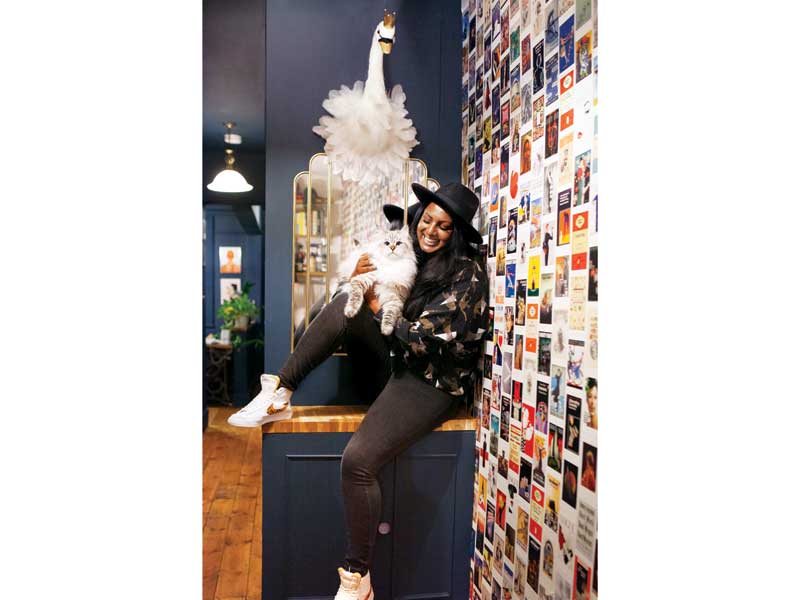
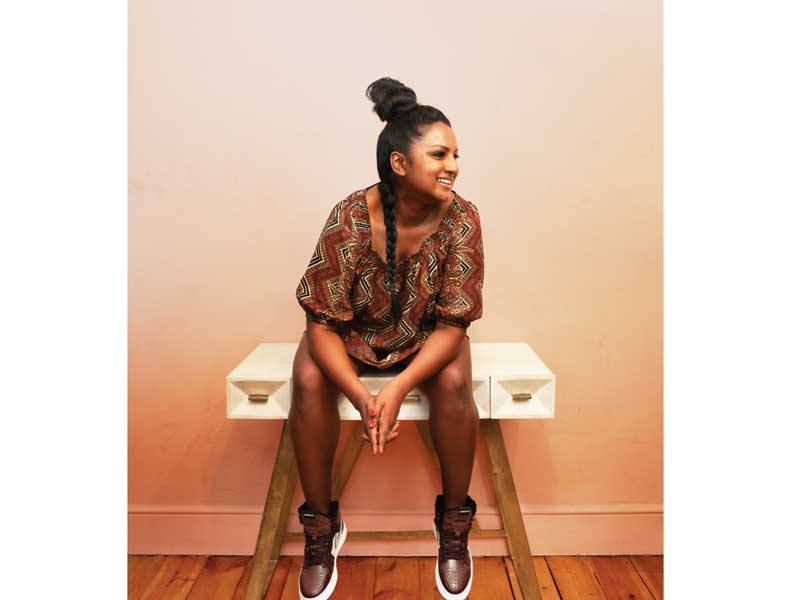
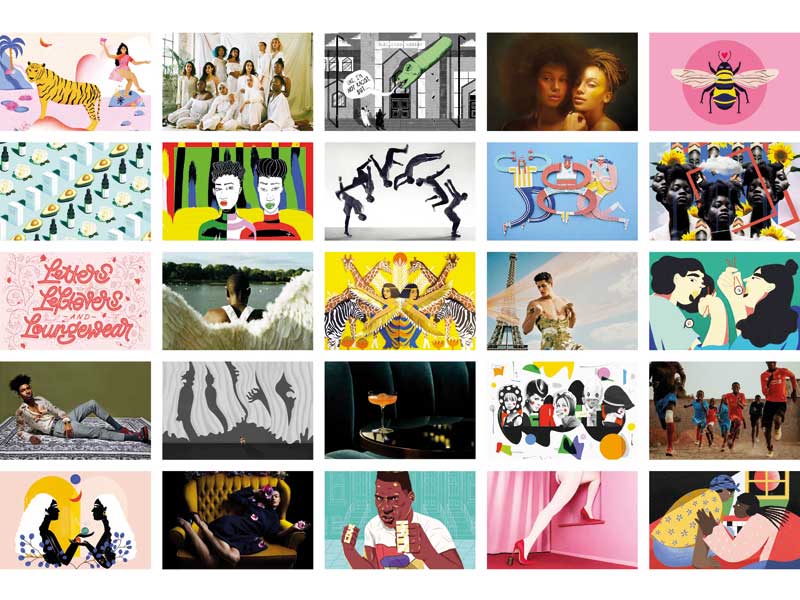
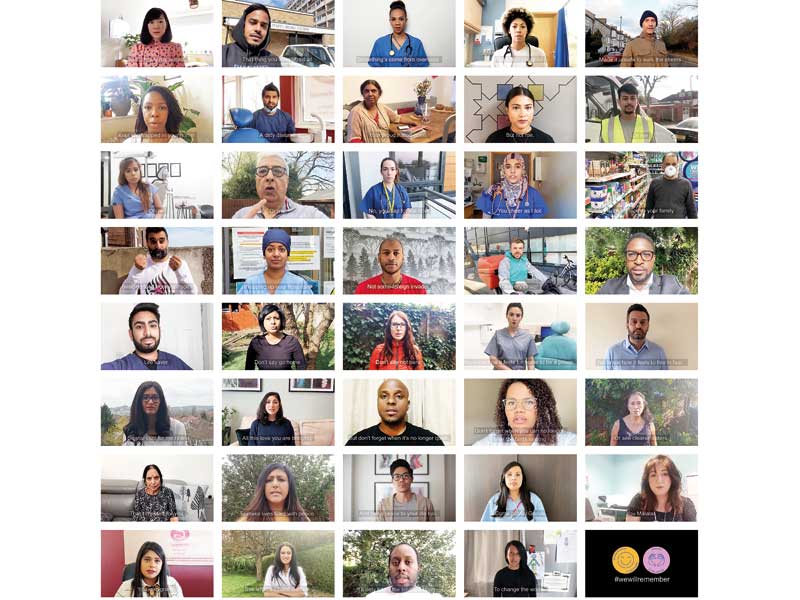
Brit Sri Lankan Sachini Imbuldeniya, the Founder and Executive Creative Director of award-winning photography and illustration agency Studio PI talks to Features Editor Tina Edward Gunawardhana on her mission to champion those individuals whose voices aren't heard enough and whose talent isn't seen enough, creating a more equitable playing field for future generations of creatives.
Photographs: Ruben Alvarado
Feted as one of Adland’s top 30 female non-binary and gender non-conforming rising stars, Sachini Imbuldeniya is on a steadfast mission to make the creative industry as diverse as possible by creating a fairer world for photographers and illustrators. Studio PI which Sachini fearlessly set up during the pandemic while working for one of the UK’s largest media companies, News UK has reached great heights. Her work has won her a clutch of accolades and she is viewed as an inspirational women of colour who is working tirelessly to ensure there is diversity within the creative industry. Another notable achievement is her video campaign to complement the poem You Clap For Me Now written by Darren James Smith to celebrate key workers during the pandemic which went viral with over 300 million views. It was selected by the United Nations as an official message of hope and solidarity, and recreated in different languages for countries across the world. Breaking the mould in more ways than one, Sachini Imbuldeniya is a Brit Sri Lankan who is shattering the glass ceiling in her own inimitable style.
What inspired you to join a career in design?
I’ve always had a passion for creativity and remember spending endless hours as a child colouring-in outfits on a toy fashion wheel with my sister Charuni. I also loved drawing, writing and painting and used it as my escape from the stresses of everyday life.
This didn’t suit my traditional Sri Lankan family though. I was pressured to pursue a career in science so I could get what was deemed as a ‘proper job’. It’s a common misconception in South Asian families that the only routes to success are by becoming a doctor, dentist, accountant or lawyer. I remember my mum saying: ‘Art? What are you going to do with that? Sit on the street and paint?’
But my rebellious streak enabled me to follow my heart and
I ended up getting a rare spot on an Art Foundation course. Thankfully I had the support of a brilliant teacher who believed in me and convinced the lecturer to take me on despite me not having an A-level in art. I pretty much owe this man my entire career.
What was your first job?
When I finished my degree, a BA in Visual Communication Design which I graduated with first class honours, I wanted to take a year out and travel the world; to have that well-deserved break and explore as many countries as humanly possible before getting tied down with a job.
But the day after graduation I got a call from my university lecturer asking if I wanted to go for an interview for the position of Junior Designer at The Sunday Times Magazine. The Senior Designer at the time had gone to my university many years before and was looking for brilliant graduates to bring on board.
This was a once-in-a-lifetime opportunity so I felt I had to take it even though I wanted to jet off to the nearest tropical island.
Fast-forward sixteen years and I still haven’t managed to take that year out, but I don’t regret it. It’s been a brilliant ride so far.
You are the Creative Director of Bridge Studio which is News UK’s award winning content agency. Tell us a bit about your role and News UK.
I head up a team of exceptionally talented Art Directors, Designers and Picture Editors. We create campaigns that work in print, digital, social, video, radio and events. I oversee the creative on all of the work we produce and ensure that we are delivering the most innovative, engaging and forward-thinking solutions to a whole spectrum of clients – from Gucci to Google and everything in between.
News UK owns of a stable of brands including The Times and The Sunday Times – the biggest-selling quality newspaper in Britain, as well as radio stations and digital programmes read all over the world.
Their award-winning titles reach a huge audience and span all content categories including food, sport, fashion, beauty, travel, motoring, tech, entertainment and wellness.
You are also the Founder and Executive Creative Director of Studio PI. What does the name mean and what motivated you to start this agency?
The straightforward explanation is that the P stands for photography and the I for illustration. But the more in depth meaning aligns with our mission to help underrepresented artistes get a bigger slice of the pie.
I’ve spent most of my career commissioning new photography and illustration and have always relied on the big, established agencies to source artists. Time and budgets are tight, so many senior creatives end up using the same people over and over again. I’ve done it myself: it’s just quicker and easier when the pressure is on.
But that tunnel-vision can lead to work that is stagnant and uninventive.
As creatives we always want to make things that are unique and stand out from the crowd, but it’s a bit like Einstein’s definition of madness: ‘Insanity is doing the same thing over and over and expecting different results’.
It also means that our industry is not as diverse as it should be.
Last year The UK Government stated that the most underrepresented groups in the creative sector are: women, people of colour, people living with disabilities and people from working class backgrounds.
I fall into all four of those groups, so I know how lucky I am to have got to where I am today.
But we can’t rely on luck to make a more equal world.
We have to fight for it.
So I set up Studio PI. It’s an artist agency that only represents individuals from those four categories. Our mission is to celebrate diversity by creating a fairer world for photographers and illustrators. It’s also an easily accessible space where busy senior commissioners can go to source fresh talent with dynamic perspectives. I’ve done all of the hard work for them so being ‘busy’ can no longer be an excuse.
Studio PI is described as the agency that champions the underrepresented. Where does your passion to represent the underrepresented stem from?
Being a woman of colour, from a working class background, with a disability (Pre-Menstrual Dysphoric Disorder) means that I have had to overcome many hurdles to get to where I am today.
I went to a very multicultural London University, but out of the 80 students on my course only 3 actually managed to get a job in this industry and for a big chunk of my career, I was the lone brown face in a sea of white.
I’ve always felt a weird sense of gratitude for being one of the ‘lucky’ few that managed to get a foot in the door. So I worked harder than everyone else and tried to keep my head down because I didn’t want to say or do anything that might risk me losing a job that I fundamentally loved.
And I do love it. Apart from the casual racism that I’ve encountered.
I remember being told that I wasn’t allowed to put a black man on the front cover of a national magazine. The Art Director just stared at me horrified and said: ‘What would middle England think?’
That black man was Jay-Z.
On another occasion, an Editor recommended that I didn’t spend my lunch hour with my only ethnic colleague – apparently if I was seen associating with ‘inferior people’ like her, I would never make it anywhere in my career.
And then there was the time that an Art Director requested to use my hands in a photoshoot – on the condition that he could ‘photoshop them white’.
These are just three examples of many.
I felt like I had to get into a position of power in order to change this, and to challenge the status quo. I started the day
I became a Creative Director.
Why is it important to challenge the status quo, celebrate diversity and promote equality?
Because it’s the right thing to do. We live in a multicultural world that isn’t just white, or male, or skinny, or rich. There are people from all walks of life and every single one of them deserves to be celebrated.
You can only aspire to be what you can see. So if you’re a young, dark-skinned, Muslim child and there is no one that looks like you in magazines or on the TV, you struggle to relate. The media can often create an ‘ideal’ that isn’t your reality and it makes everything feel unattainable. What we keep forgetting is that diversity is the ideal – making room for different ways of seeing the world.
That’s the only way we progress.
Sometimes it’s a vision of the world you don’t share or even recognise. But you place your trust in the artist’s lived experience to create something honest and genuine.
This can of course be scary, but being truly creative has always been about making something new that lives just outside your comfort zone and redraws the boundaries of our world.
What lessons do you think Sri Lanka can take from the need to be more aware of celebrating diversity and promoting equality?
Look at any magazine shelf in the UK and you can see that the beauty ideal is still a white, wealthy, flawless human. And this mindset extends to Sri Lanka in many ways. It blows my mind that products like ‘Fair & Lovely’ still exist – a beauty product that effectively bleaches your skin to make it lighter.
There’s a horrible misconception that dark is ugly and fair is beautiful. We’re taught it from a young age: Snow White is good, the black sheep is bad. Muhammad Ali said: ‘everything white is good, and everything bad is black. The ugly duckling was a black duck, and the black cat is bad luck. And if I threaten you, I’m going to blackmail you. I said ‘Mama, why don’t they call it whitemail? They lie too.’
I haven’t been to Sri Lanka for a couple of years because of the pandemic, so I may be wrong – but I don’t remember seeing any adverts that feature very dark skinned people.
Sri Lanka’s advertising agencies need to be braver and start challenging the status quo.
But it’s not just about skin colour in Sri Lanka, it’s about class, access to education, equal opportunities for women, sexuality and religion too.
The definition of equality is: the state of being equal, especially in status, rights, or opportunities.
My dream is to get to a place where agencies like Studio PI no longer need to exist because equality is the norm. But I think Sri Lanka – like the UK – still has a long way to go.
Who would you describe as your role model?
My mum. She left Sri Lanka and her seven younger siblings in the 1960’s after her father passed away. She came to the UK to join the NHS in response to an appeal from the health service as it was suffering from acute shortages of staff and desperately needed migrant workers to help rescue it.
I grew up on one of the roughest council estates in London and my dad passed away when I was 10, but my mum was the rock that kept our family together. She worked endless hours to keep myself and my siblings clothed and fed whilst also sending money to her family in
Sri Lanka. She’s incredibly brave, kind, generous, driven, strong, selfless and hard working.
If I can become even half the woman that she is, it would be a massive achievement to me.
Since the inception of the internet, critics have opined that Magazines need to adapt or die. As an industry stakeholder what is your opinion on this statement?
They need to adapt, for sure. Magazines today need to be more inclusive to grow audiences, be brave creatively and evolve with technology.
Magazines have a hugely important role in our culture, and that’s mostly because we’re constantly inundated with overwhelming content that tries to keep us up to pace with what’s going on in the modern world – from Twitter feeds to newspapers and everything in between.
Magazines are more thoughtful, more considered. They take a deeper dive into subjects – whether that’s a single food, a movement, or a moment in time.
And when you look around the world at the mess we’re in – from George Floyd to climate disasters and famines and uprisings in countries all over the world.
If this stuff tells us anything, it’s that we need to take a step back and stop rushing around endlessly consuming junk food content that purely shouts about the chaos.
The world is posing some seriously big questions, and we need to come up with better answers, be more thoughtful, more considered.
And that’s what magazines do.
They shape the way we think about the things we care about. Magazines can guide us with a deeper knowledge. Twitter might tell us what’s happening right now. But Magazines tell us where we are going. More importantly, they tell us where we should be going.
That’s why it’s so important that magazines continue to survive.
What motivated you to come up with the video concept for the poem You Clap for Me Now written by Darren James Smith?
The poem was actually inspired by an interview that Darren did with my mum for The Sunday Times Magazine about her experience of coming to the UK from
Sri Lanka in the 60’s. She found Britain to be very welcoming and tolerant – something very different to the rise in hate crimes seen in the last ten years. Especially with things like Theresa May’s ‘hostile environment’ policy, the Windrush Scandal and of course Brexit.
The pandemic changed that. Jobs that were once deemed as ‘unskilled’ were suddenly valuable, and the country never felt quite so much like a United Kingdom, with everyone doing their bit to help and support each other through a very uncertain time.
You Clap For Me Now asked us to celebrate our key workers now, but also remember their sacrifice once the pandemic is over, and not let us go back to the negative attitudes of the past.
When I read the poem it blew me away.
I knew it had to be turned into a video but it was during the height of the first lockdown and I’d never produced a video remotely before. It was definitely challenging and a huge learning curve for me, but all of the wonderful individuals featured gave up their time for free because they believed in the importance of spreading this message.
What was your reaction to the worldwide response to the video?
I never expected it to go viral. I posted it on my personal Instagram and within hours it just went crazy. It ended up having 300 million views worldwide and was retweeted by the likes of J K Rowling, Gary Lineker, Sadiq Khan and Jameela Jamil.
It was also selected by the United Nations as an official message of hope and solidarity and recreated in different languages for countries across the globe. I remember my uncle in Sri Lanka calling me and saying he saw my name on TV. I couldn’t believe it had gone that far.
But the most wonderful and meaningful message I received was from the head of diversity and inclusion at North Middlesex hospital. She asked if she could play it on repeat in the hospital atrium because it filled her staff with so much hope and positivity during this time of crisis.
That to me was everything.
In 2021 The British Media Awards had included you as one of Adland’s top 30 female, non-binary and gender non-conforming rising stars. What did this accolade mean to you?
Recognition like that only reassures me that I’m on the right path and it gives me the drive to continue doing what I’m doing.
Trying to change the mindsets of people that are often institutionalised can be incredibly difficult and draining. There has been many occasions where I’ve felt like I’m just bashing my head against a brick wall. But then you have one conversation out of a hundred where the person just gets it and you breathe a sigh of relief.
I may only be making baby steps to help reshape this industry, but an accolade like this really does prove that we’re at least heading in the right direction.
From a young age you suffered from unexplainable depression. Sri Lankans view it as the elephant in the room. What is your advice to people who are suffering from depression and mental health issues?
I suffer from PMDD (Pre-Menstrual Dysphoric Disorder) which has been classed as a disability under the Equality Act 2010 and affects 1 in 20 women. It means that
I can lose around 182 days a year to severe depression and it’s something that I’ve had to deal with since I started my first period.
For years I was ashamed to talk about it because it was seen as a ‘taboo’ subject and
I didn’t want to appear ‘weak’. But after deciding to speak publicly about it for the first time in April last year, I suddenly felt like a whole weight had been lifted from my shoulders.
The stigma surrounding mental health needs to change, and this is especially true in South Asian cultures. An illness is an illness regardless of whether it’s physical or mental and there should be no shame in seeking help or taking medicine to get better.
We should break down this taboo. Whether that’s via characters in TV shows or advertising agencies partnering with mental health charities to create powerful campaigns that really resonate; or workplaces embracing a culture that promotes mental health awareness, or even getting celebrity advocates to be the inspiring figures that talk publicly and openly about it.
The stats don’t lie: Today, nearly
1 billion people live with a mental disorder and in low-income countries, more than 75% of people with the disorder do not receive treatment. Every 40 seconds, a person dies by suicide and about 50% of mental health disorders start by the
age of 14.
That elephant in the room is trampling many of us to death. Are we really going to keep ignoring it?
What plans do you have for the next 5 years?
I never really think that far ahead. I live for the moment and take each day as it comes, but hopefully we’ll be in a place where Studio PI no longer needs to exist because equality has finally become the norm, and I’ll be living on a beach on the south coast of Sri Lanka with my art inspired cafe and dog rescue centre.

